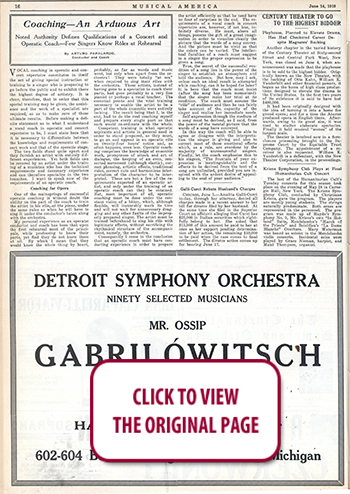 100 YEARS AGO IN MUSICAL AMERICA (284)
100 YEARS AGO IN MUSICAL AMERICA (284)
June 14, 1919
Page 16
Coaching—An Arduous Art
Noted Authority Defines Qualifications of a Concert and Operatic Coach—Few Singers Know Rôles at Rehearsal
By ARTURO PAPALARDO, Conductor and Coach
VOCAL coaching in operatic and concert repertoire constitutes in itself the act of giving special instruction or training to a singer who is preparing to go before the public and to exhibit there the highest degree of artistry. It is clear, therefore, that in order that this special training may be given, the assistance and the work of a specialist are required, so as to make sure of those ultimate results. Before making a definite statement as to what I understand a vocal coach in operatic and concert repertoire to be, I must state here that it is necessary to differentiate between the knowledge and requirements of concert work and that of the operatic stage.
The two fields stand quite apart and they furnish an artist with entirely different experiences. Yet both fields can be covered by an artist under the training of a musician who has the technical requirements and necessary experience and can therefore specialize in the two branches. I want to speak now of the requirements of an operatic coach.
Coaching for Opera
One of the mainsprings of successful operatic coaching is without doubt the ability on the part of the coach to train the artist in his rôle at the piano, under the same rules as when he will have to sing it under the conductor’s baton along with the orchestra.
My personal experience as an operatic conductor and coach has been that upon the first rehearsal most of the principals, while professing to know their parts, yet find they do not know them at all. By which I mean that they would know the whole thing by heart, probably, as far as words and music went, but only when apart from the orchestra! They were totally “at sea” when required to sing their rôles with the orchestra. Those artists, instead of having gone to a specialist to coach their parts, had gone probably to a very fine pianist or perhaps a vocal teacher. The essential points and the vital training necessary to enable the artist to be a part of the whole ensemble were entirely lacking. The result being that I, in the end, had to do the real coaching myself and prepare every single part so that each would co-ordinate with the whole.
Competent training is what operatic aspirants and artists in general need in order to stand prepared, as they must, to go on and appear in an operatic role on twenty-four hours’ notice and, as often happens, even less. Operatic coaching comprises the knowledge of ensemble work, promptness of attack and art of dialogue, the keeping of an even, concerted movement (although elastic) correct phrasing, artistic effects, traditional rules, correct cuts and harmonious interpretation of the character to be interpreted. These are but a few of the requirements expected of an operatic artist, and only under the training of an operatic coach can they be obtained. But, most important of all, operatic coaching must be done under the constant vision of a baton, which, although flexible, will inexorably mark its time and will not wait for unnecessary dragging and any other faults of the improperly prepared singer. The artist must be trained beforehand to sing his rôle with legitimate effects, without sacrificing the rhythmical structure of the accompaniment, namely, the orchestra.
Consequently I come to the conclusion that an operatic coach must have conducting experience in order to prepare the artist efficiently so that he need have no fear of surprises in the end. The requirements of a vocal coach in concert repertoire are, however, if not less, infinitely diverse. He must, above all things, possess the gift of a great imagination in order to visualize clearly the picture that the words of a song convey. And the picture must be vivid so that the colors can be varied. The intellectual faculties of a coach must suggest to a singer the proper expression to be given a song.
True, the secret of the successful rendition of a song lies in the power of the singer to establish an atmosphere and hold the audience. But how, may I ask, unless such an ideal result is attempted while coaching, can it be hoped for later? It is here that the coach must insist (after the song has been memorized) that the singer make her trial at its rendition. The coach must assume the “rôle” of audience and then he can fairly take account of the capacity of the singer and realize her immediate needs.
Self-expression through the medium of a song must be derived, as I said, from the power of the mental picture that the words of a song have conveyed.
In this way the coach will be able to agree or disagree with the interpretation the singer is giving and also to correct most of those emotional effects which, as a rule, are overdone by the majority of un-resourceful singers. Finally, let the coach ·emphasize this to his singers, “The fountain of your expression is inextinguishable and the effects to be derived from the text of a song are unlimited, provided you are inspired with the ardent desire of appealing to the soul of your audience.”




 RENT A PHOTO
RENT A PHOTO





